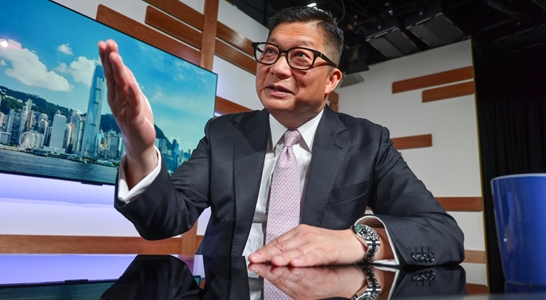
It’s just a bunch of words slung together. The South China Morning Post says that Hong Kong security chief Chris Tang “has revealed” that “authorities have not rejected a single protest application since 2022.”
According to the Post’s paraphrase of Tang, this is “not a sign of civil society in retreat [but of] the availability of multiple channels to express opinions.”
Who knew that as a Hongkonger you could just go on the Hong Kong Six O’clock News and rattle off a litany of fundamental objections to the Chinese Communist Party in lieu of taking your complaints to the street? And do so without fear of arrest?
Or would this and many another form of publicly voicing opinions opposed to the Chinese party-state not be among the “multiple channels” to which Secretary for Security Chris Tang is referring?
Many discussions
Tang: “We engage in a lot of discussions with different groups when they have an opinion, we listen and we react. Probably they consider [this to be] better than, you know, just go out on the street and cry, because we have dialogue, we react.”
Uh huh. So no chance, then, that because of the Chinese Communist Party’s massive crackdown in 2019 and 2020 and ensuing years on political liberties in Hong Kong, including the right of assembly, Hongkongers are less likely these days to either organize an anti-government demonstration directly or to apply to the government for a permit to organize an anti-government demonstration?
No chance that imprisoning some pro-democracy activists and offering bounties on others currently living overseas would tend to discourage applications?
Same story:
The city’s most outspoken rally organisers have disbanded in recent years. Both the Civil Human Rights Front, the umbrella activist group behind many of Hong Kong’s largest protests, and the Hong Kong Alliance in Support of Patriotic Democratic Movements of China, which organised the annual candlelight vigil for the Tiananmen Square Crackdown, disbanded in 2021.
In the same year, the Post counted more than 50 activist groups, trade unions and political parties that had disbanded as the Beijing-imposed national security law came into force a year earlier.
But Tang said residents still continued to enjoy the right to assemble under the law….
The Post also reports that Tang would have no problem prosecuting hitherto neglected arrestees for their participation in the anti-government demonstrations of 2019 if new evidence emerges. His agency is still investigating persons arrested for those protests.





